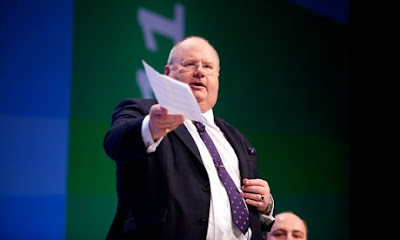FIRST PUBLISHED BY: HARROW EAST
NEW EVIDENCE OF SERIOUS ERRORS IN COUNCIL TAX BILLS - LABOUR'S COUNCIL TAX COVER-UP
The last Government and the Ministers are responsible for deliberately covering up serious problems over the banding of homes for Council Tax, Bob Blackman, Conservative Parliamentary Candidate for Harrow East, warned. New figures have revealed that Whitehall's Council Tax snoopers have been forced to redo the Council Tax bands of thousands of homes after appeals by householders across Harrow and the country.
Official papers from the Government Council Tax inspectors, the Valuation Office Agency, have admitted that many homes are in the wrong band for Council Tax and families have been paying over the odds for years. Accidentally leaked minutes have confessed that if the tax errors became known, the Government would lose money and would have to pay tax refunds. This was also ruled out since it would generate "adverse press coverage… in the current climate".
The combination of a campaign by 'Money Saving Expert' Martin Lewis, the publication of these leaked minutes and the ITV Tonight documentary, has produced a surge in Council Tax appeals. Now Parliamentary Questions have forced the Government to publish detailed figures on the changes to Council Tax bands. In the last five years, 500,000 existing homes have had their Council Tax band changed: 133,985 homes have moved down a band. In Harrow alone, 321 homes have moved down a Council Tax band as a result of appeals. This proves there are serious and systematic errors in the banding of homes, which Ministers have been covering up to save money.
Wales has been used as a test-bed for a Council Tax revaluation. Three times as many homes moved up a band as down. Yet since that 2005 revaluation, a succession of errors has also been uncovered with the Valuation Office Agency's work. To date, 1 in 20 homes in Wales have had their post-revaluation banding corrected. A wholesale Council Tax revaluation has thus caused more problems than it solved.
Bob Blackman said:
"We now have clear evidence of a Council Tax cover-up. The Labour Government has been caught red-handed fiddling Council Tax to make families in Harrow and across the country pay more. Whitehall bureaucrats know that many homes across the country are wrongly banded, but have refused to correct the tax inspectors' errors to save the Government money and save face. "The whole basis of our tax system is undermined if the state conspires to over-charge the public. Labour Ministers only want to reform the Council Tax system if it rakes in extra cash for the Government coffers."
Council Tax bills vary according to the banding of a property; for example, a Band E house pays 22% a year more than a Band D house (or £315 a year more for a typical home in England). Last year, Labour Ministers were forced to publish the minutes of the Valuation Office Agency's Council Tax Revaluation Programme Board. The Valuation Office Agency are England's Council Tax inspectors, and are an arm of HM Revenue & Customs. The minutes show the fallout after the controversial plans for an English Council Tax revaluation in May 2007 were postponed in October 2005. The Revaluation Board minutes include a series of comments which are blacked out, since they relate to "an ongoing policy issue".
The secret comments show that the revaluation exercise identified certain homes in certain streets were currently wrongly banded, and are paying over the odds (so-called 'consequential'). Yet Ministers covered up this information due to the implications: having to pay refunds and lose money and the subsequent bad press coverage. The secret minutes stated: "What action should be taken by Groups on consequential identified following data enhancement. Concern was expressed about the possible knock on implications for billing authorities and adverse press coverage this could generate in the current climate. Action Point to establish potential numbers involved with GVOs. Action will then be agreed with ODPM and Ministers".
SURGE IN APPEALS REVEALED WIDESPREAD ERRORS
Financial guru, Martin Lewis ('Money Saving Expert'), has run a big campaign on errors in Council Tax banding, highlighting errors by the Valuation Office Agency. Combined with the cover-up exposed by Conservatives, this has lead to a surge in the number of Council Tax appeals.
The BBC said: http://news.bbc.co.uk/1/hi/business/6296849.stm BBC News Online, "Homeowners must check tax band", 25 January 2007. When a home is placed in too high a Council Tax band, any subsequent refund can date back for years, incurring considerable cost to the Exchequer. New Parliamentary Questions by Conservatives have forced Ministers to publish new details exposing the scale of errors to existing Council Tax banding of homes across England, following that the surge in appeals.
"Mr. Stewart Jackson: To ask the Secretary of State for Communities and Local Government with reference to the supplementary memorandum from the Valuation Office Agency presented to the Treasury Select Committee, dated 29 October 2008, which amendments to the Council Tax valuation lists involving movements to a lower band were made in each billing authority in each of the years to March (a) 2006, (b) 2007 and (c) 2008.
John Healey: This information is currently being assembled for publication. I will place a copy in the Library of the House as soon as possible."





